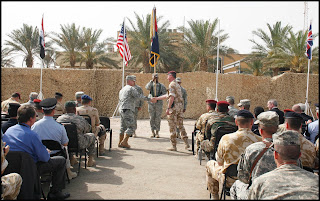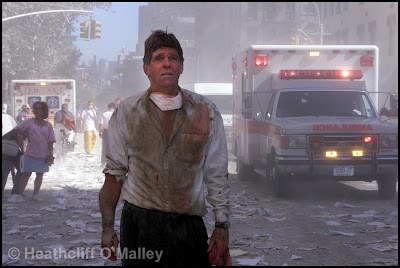The handover of Basra

The recent handover ceremony of Basra airbase in southern Iraq from British to U.S forces marking the end of six years of British military involvement in an unpopular war was in the end a muted affair. A deeply touching memorial service prior to the ceremony involved the reading of the names of all the 179 servicemen killed since the spring 2003 in front of a memorial wall, which left a lump in my throat especially so when one of the names mentioned last moments I had witnessed two years earlier in Basra palace.
To then see their sacrifice and surviving servicemen and women’s hard work reduced to the shaking of hands by two military commanders and the lowering of the 20th Armoured brigade’s flag was difficult for me. How else I expected the British pullout to end is a debateable, it isn’t as if the Army could exactly hold a victory parade through the streets of Basra after leaving the city in a state of near anarchy two years earlier, unable to keep the peace ourselves , being both under manned and under resourced .

The British venture in southern Iraq will be scrutinised for many years to come, and many questions will be asked I’m sure about if we did the right thing or not, and wether the tactics used and resources placed at the military’s disposal by our Parliament were indeed adequate.
In briefings prior to the handover journalists were told that life has greatly improved for the inhabitants of Basra since the fall of Saddam Hussein’s Baathist regime, which may, with a small pinch of salt be true, but if so how much of this can be attributed to our involvement ? One could argue that if it wasn’t for the U.S change in counter insurgency tactics in Baghdad and their support of Prime minister Maliki’s “Charge of the Knights” campaign which finally brought relative peace and security to the streets of Basra in the spring of 2008 little would have changed and in fact life would be worse than it was under Saddam as it was in the bad years of 2004-2007.

I first came to Iraq in the autumn of 2002 after spending the last 12 months covering the 911 attacks on the twin towers in New York and the subsequent war in Afghanistan. Witnessing the futile attempts of the UN weapons inspectors in the final days of Saddam’s regime to avert a war , and the subsequent conflict which has ultimately cost the lives of hundreds of thousands of civilians, some who happened to be friends of mine. The “War on Terror” had become somewhat personal to me and I felt that the conflict in Iraq at least, I had to see through to the end. Wether I now any longer have the energy and the will to fulfil that same sense of duty with the continuing conflict in Afghanistan is another matter.
Iraq before the war was a depressing country to be in , most of us journalists lived in the Al Rashid hotel in the presidential district of Baghdad, and were followed closely by rather inept mukhabarat secret police officers assigned to each reporting team. We’d fill most days either following the UN inspectors to mostly derelict former weapons sites and run down military bases across the breadth of Iraq and others at staged press junkets organised by the regime which often consisted of cynically staged political rallies, hospital visits to see young Leukemia sufferers (allegedly from the West’s use of depleted uranium in it’s missiles) and any self generated stories we could persuade the corrupt officials of the Information Ministry to let us cover.
In the evenings we would visit outdoor restaurants in the more affluent neighbourhoods or visit boozy parties in closing down Embassies and in colleagues hotel rooms fueled by cheap alcohol sold in Christian run liquor stores (cheap for a western journalists salary anyway. I once came across a group of Baghdad doctors who were splitting a bottle of Johnny Walker 3 ways with their monthly salaries)
Iraqi’s in Saddam’s Iraq, were on the whole deeply distrustful after years of strict authoritarian rule. One false word ran the risk of imprisonment, torture or even death, and I never found anyone , not even my late driver Salah, who would dare say a bad word about Saddam and his cronies. Economically life was tough too, sanctions and the regimes voracious appetite for personal enrichment had left the nation bankrupt, starving, and with a healthcare system once the envy of the Arab world now dilapidtated and short of essential medical equipment.
This was nothing compared to Iraq in the first years after the 2003 war however . Except for the pinning down of U.S forces in Nasiriyah the initial war in Iraq, as most of us know went relatively smoothly and ended within weeks. Over the coming months desperate searches were made for Saddam’s “Weapons of Mass Distruction” but none were found which certainly didn’t surprise myself and some others and made the more hawkish journalists begin to revaluate their entire view of the invasion in the months to come. This minor hiccup was easier for the politicians to reconcile, they simply moved the focus over to Regime Change from the original premise of disarming a potentially dangerous ally of Al Qaeda with weapons capable of striking the west within 30 minutes.

The relative peace and euphoria of liberation in Baghdad and the neighbouring cities however did not last long once there was nothing else to loot. Iranian backed religious and political figures began to rise out of ashes of decades of Shia oppression by the Baathist Sunni minority and began to fill the power vacuum where western troops unprepared for post war peacekeeping were held back, especially in Baghdad and Basra.

The lawlessness and open borders of the once brutal police state also attracted foreign fighters sympathetic to Osama bin Laden, finally fulfilling the neo-con prophecy of an Iraq infiltrated by Al Qaeda. Iraq, once the cradle of civilisation and the home of the garden of Eden was to become the killing grounds of the “war on terror” , and disenfranchised Baathists and wannabe terrorists from around the world descended on Iraq to fight the foreign Christian invader, queuing up on Syria’s border to martyr themselves in the name of Allah. In fact there were so many, it was reported, that Al Zarqarwi’s men had to turn many away at the border as waiting lists were so long.
Hostage taking became rife by late 2004 and the western soldiers and civilian victims kdnapped by Islamic extremists who gained publicity in the world’s press were the tip of the iceberg . Innocent Iraqi civilians were kidnapped by criminal gangs in the their thousands and returned for ransoms paid by desperate families already bankrupted by the ravages of war.
It was at this time that I felt the situation on the ground as a journalist had become too dangerous to operate any longer as a “Unilateral” and began to “Embed” instead with the military, an often frustrating and unrewarding method of working especially with the British, but safer nonetheless. It also gave me the opportunity to see the conflict from another point of view; that of the young western soldier, often in his late teens or early twenties, hoping to make a difference or help pay their way through college, or both.

I had previously seen the tragic consequences of a simple misunderstanding at a vehicle checkpoint that had led to the death of a family in a car peppered with NATO .556 rounds and to finally be on the other side of the wire provided an interesting insight into life as a peacekeeper in Iraq, and I developed a great sense of respect them.
Five years on I’m relieved that it appears to almost finally be over , that our troops are nearly all home, and that life in Iraq is now achieving some form of normality for the general populace. Wether the “trickle down effect” of the countries oil wealth will ever benefit the general populace remains to be seen but things now do finally seem to be moving in the right direction . History will be the final judge our venture .


Comments